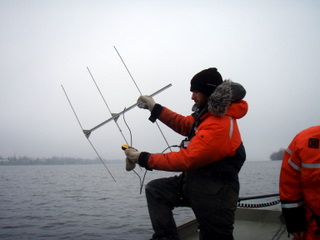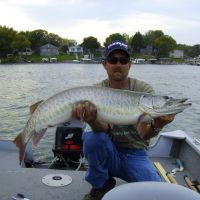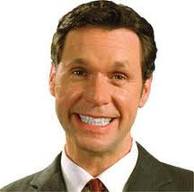|
|
Posts: 462
Location: Syracuse, Indiana | Here in Indiana surface water temperatures are approaching or have hit (depending upon whose water temperature guage you use) the 80 degree mark. There is much discussion about preserving the fishery by not fishing for them until temps go down to below the 80 degree mark. Excuse my "duh" moment, but is there any scientific data with regards to water temps and C&R success? Is this the topic that will be broached in the research set to begin at Carlton (sp?) University? | |
| | |

Posts: 2024
| David,
At the moment there is no data(aside from anecdotal evidence) *for muskies* that relates water temperature to C&R success (i.e., survival).
Water temperature is a covariate we will analyze, but it is not the basis, per se, of the study.
Edited by esox50 6/25/2009 8:14 AM
| |
| | |
Posts: 462
Location: Syracuse, Indiana | Thanks, Sean.
Google this for interesting information:
Casselman, S. J. 2005. Catch-and-release angling: a review with guidelines for proper fish handling practices. Fish & Wildlife Branch. Ontario Ministry of Natural Resources. Peterborough, Ontario. 26 p
Edited by dcates 6/26/2009 12:35 PM
| |
| | |
Posts: 518
Location: Cave Run Lake KY. | Queg- fishing temperature chart - freashwater gamefish - muskie - lower avoidance 55 dg. fahrenheit - optimun 63 dg. - upper avoidance 72 dg. This is from my fishfinder temperature gage. reprinted with permission from fishing world magazine. I do not fish muskies in water over 78dg. unless I plan to eat them. take care marv. | |
| | |

Posts: 1184
Location: Iowa Great Lakes | Remember your talking surface temp not real water temp, If your reading 80 at sunrise then thats warm but 80 at 4pm isn't a concern if you read 75 at sunrise. Luckily we don't have to worry about reaching and holding 80 degree temps. | |
| | |

Posts: 20278
Location: oswego, il | Oxygen levels play the biggest part. Some lakes are junk when the water gets that warm and have seen no fish life below 8ft on some lakes. Some lakes have good oxygen levels but 80 is a good benchmark to stop. | |
| | |

| I think any of us can look back on things that happen to fish when the temps get up there and say with certainty that those effects are negative no matter if its in your aquarium at home or in the bait bucket or live well.
I'll give you 2 examples about high temps changing the way fish are regulated, in MN there is no Muskie Tournament permits issued during these times due to past disasters that had a tremendous effect on the fishery.
In MN also any Walleye tournaments conducted in these high temp periods are mandated to be Catch and Kill due to high mortality.
Any biologist worth his salt will tell you there is increased mortality during hot water periods whether they support Peta or not I'm not sure.
Not everyone cares or understands mortality factors and how to adjust their fishing to preserve the fishery, some just want to fish for better or worse and they'll stock more.
We were just encouraged in the latest Muskies Mag to use our infrastructure as a tool so that may be a good place for you to start your search for info; Tom Betka or any DNR biologist, although you may be looking for Muskie research alone to confirm these issues as fact that will be very difficult if not impossible to to attain; as I was told by senior biologists when I was doing research for my C&R information, mortality factors are the same for all fish, a fish is a fish.
Here are some peer reviewed study's directly linking high water temps to mortality.
We have to decide whats more important, The fish or the Angler; the angler will be there if the fish is available, if the fish go so goes the anglers; I'm pretty sure that's what Gill had in mind when he called it Muskies Inc and not Muskie Anglers Inc.
North American Journal of Fisheries Management 1996; 16: 364-370
ARTICLES
Walleye and Sauger Mortality Associated with Live-Release Tournaments on the Lake Winnebago System, Wisconsin
GREGORY C. HOFFMAN, DANIEL W. COBLE, RICHARD V. FRIE, and FREDERICK A. COPES
Wisconsin Cooperative Fisherv Research Unit,2 Universitv of Wisconsin, Stevens Point, Wisconsin 54481, USA
RONALD M. BRUCH and KENDALL K. KAMKE
Wisconsin Department of Natural Resources, Box 2565, Oshkosh, Wisconsin 54903, USA
Abstract
Mortality was estimated for three, 2- or 3-d, professional, live-release tournaments for walleye Stizostedion vitreum and sauger S. canadense held on the Lake Winnebago system, Wisconsin, in 1991 and 1992. Estimated initial mortalities for the three tournaments were high—48%, 34%, and 80%—perhaps because the lake temperature exceeded 20°C. Estimated delayed mortalities (within 1 week of release of tagged fish) were 18%, 9%, and 0%. Estimated tournament-related long-term mortalities, based on tag return rates during the ensuing year, were 1%, 2%, and 0% of the total catch for each tournament. Comparison of the estimated harvest for tournament and nontournament anglers for the month of tournament activity indicated that the tournaments accounted for up to 25% of the estimated total harvest of walleyes in June. Tournament mortality might be reduced by holding tournaments when water is cool, by limiting stress on fish (e.g., by requiring aeration of live wells and holding tanks and by avoiding large temperature changes), and by limiting catch (e.g., by restricting creel limits, fishing time, and angler participation; by increasing size limits; and by establishing a "catch-measure–release" procedure).
http://afsjournals.org/doi/abs/10.1577/M04-106.1
Edited by Muskiefool 8/19/2009 10:34 PM
| |
| |
|
 Water temperature and C&R
Water temperature and C&R Water temperature and C&R
Water temperature and C&R